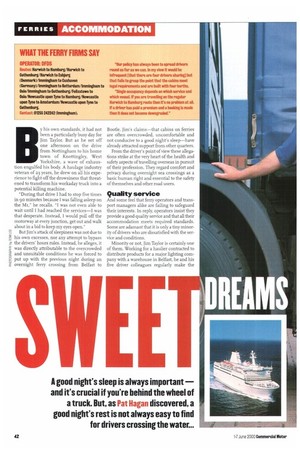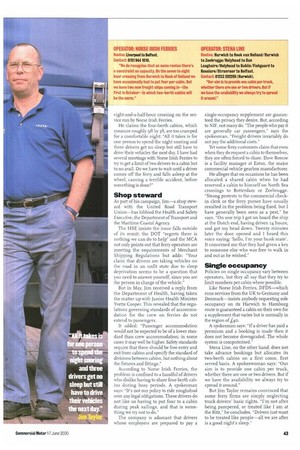S W EE
Page 44

Page 45

If you've noticed an error in this article please click here to report it so we can fix it.
y his own standards, it had not been a particularly busy day for Jim Taylor. But as he set off one afternoon on the drive from Nottingham to his home town of Knottingley, West Yorkshire, a wave of exhaustion engulfed his body. A haulage industry veteran of 23 years, he drew on all his experience to fight off the drowsiness that threatened to transform his workaday truck into a potential killing machine.
"During that drive I had to stop five times in 90 minutes because I was falling asleep on the MI," he recalls. "I was not even able to wait until I had reached the services—I was that desperate. Instead, 1 would pull off the motorway at every junction, get out and walk about in a bid to keep my eyes open."
But Jim's attack of sleepiness was not due to his own excesses, nor any attempt to bypass the drivers' hours rules. Instead, he alleges, it was directly attributable to the overcrowded and unsuitable conditions he was forced to put up with the previous night during an overnight ferry crossing from Belfast to Bootle. Jim's claims—that cabins on ferries are often overcrowded, uncomfortable and not conducive to a good night's sleep—have already attracted support from other quarters.
From the driver's point of view these allegations strike at the very heart of the health and safety aspects of travelling overseas in pursuit of their profession. They regard comfort and privacy during overnight sea crossings as a basic human right and essential to the safety of themselves and other road users.
Quality service
And some feel that ferry operators and transport managers alike are failing to safeguard their interests. In reply, operators insist they provide a good quality service and that all their accommodation meets required standards. Some are adamant that it is only a tiny minority of drivers who are dissatisfied with the service and conditions.
Minority or not, Jim Taylor is certainly one of them. Working for a haulier contracted to distribute products for a major lighting company with a warehouse in Belfast, he and his five driver colleagues regularly make the eight-and-a-half-hour crossing on the service run by Norse Irish Ferries.
He claims the four-berth cabins, which measure roughly 9ft by 3ft, are too cramped for a comfortable night: All it takes is for one person to spend the night snoring and three drivers get no sleep but still have to drive their vehicles the next day. I have had several meetings with Norse Irish Ferries to try to get a limit of two drivers to a cabin but to no avail. Do we have to wait until a driver comes off the ferry and falls asleep at the wheel, causing a terrible accident, before something is done?"
Shop steward
As part of his campaign, Jim—a shop steward with the United Road Transport Union—has lobbied the Health and Safety Executive, the Department of Transport and the Maritime Coastal Agency.
The HSE insists the issue falls outside of its remit; the DOT "regrets there is nothing we can do to help" and the MCA not only points out that ferry operators are meeting the requirements of Merchant Shipping Regulations but adds: "Your claim that drivers are taking vehicles on the road in an unfit state due to sleep deprivation seems to be a question that you need to answer yourself, since you are the person in charge of the vehicle."
But in May. Jim received a reply from the Department of Health, having taken the matter up with Junior Health Minister Yvette Cooper. This revealed that the regulations governing standards of accommodation for the crew on ferries do not extend to passengers.
It added: "Passenger accommodation would not be expected to be of a lower standard than crew accommodation; in some cases it may well be higher. Safety standards require that there should be free entry and exit from cabins and specify the standard of divisions between cabins, but nothing about the fixtures and fittings."
According to Norse Irish Ferries, the problem is confined to a handful of drivers who dislike having to share four-berth cabins during busy periods. A spokesman says: "It's not our policy to ride roughshod over any legal obligations. These drivers do not like us having to put four to a cabin during peak sailings, and that is something we try not to do."
The company is adamant that drivers whose employers are prepared to pay a single-occupancy supplement are guaranteed the privacy they desire. But, according to NIF, not many do. "The people who pay it are generally car passengers," says the spokesman. "Freight drivers invariably do not pay the additional costs."
Yet some ferry customers claim that even when they do request a cabin to themselves, they are often forced to share. Dave Roscoe is a facility manager at Eaton, the major commercial vehicle gearbox manufacturer.
He alleges that on occasions he has been allocated a shared cabin when he had reserved a cabin to himself on North Sea crossings to Rotterdam or Zeebrugge. "Strong protests to the commercial checkin clerk or the ferry purser have usually resulted in the problem being fixed, but I have generally been seen as a pest," he says. "On one trip I got on board the ship at the Dutch end, having driven 14 hours, and got my head down. Twenty minutes later the door opened and I heard this voice saying: 'hello, I'm your bunk mate'. It concerned me that they had given a key to someone else who was free to walk in and out as he wished."
Single occupancy
Policies on single occupancy vary between operators, but they all say that they try to limit numbers per cabin where possible.
Like Norse Irish Ferries, 1)MS—which runs services from the UK to Germany and Denmark—insists anybody requesting sole occupancy on its Harwich to Hamburg route is guaranteed a cabin on their own for a supplement that varies but is normally in the region of L4o.
A spokesman says: "If a driver has paid a premium and a booking is made then it does not become downgraded. The whole system is computerised."
Stena Line, on the other hand, does not take advance bookings but allocates its two-berth cabins on a first come, first served basis. A spokeswoman says: "Our aim is to provide one cabin per truck, whether there are one or two drivers. But if we have the availability we always try to spread it around."
But Jim Taylor remains convinced that some ferry firms are simply neglecting truck drivers' basic rights. "I'm not after being pampered, or treated like I am at the Ritz," he concludes. "Drivers just want to be treated like people—all we are after is a good night's sleep."








































































































